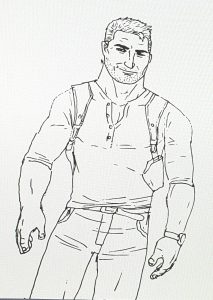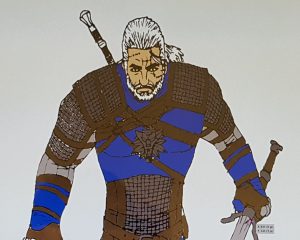
Uncharted is one of the most beloved game series of the last two console generations on both the PS3 and PS4, laying rightful claim in the eyes of many to be some of Sony’s best exclusive titles. Starting in 2007 and so far as we know, finally concluding as recently as August of 2017, this series has a decade long history of charming those who play it. With such high praise, you may ask, what makes this so special?
It has a fun cinematic story, setting and tone
Fans of Uncharted and of video games in general will probably know that Tomb Raider and its lead Laura Croft is a natural comparison and inspiration. However, an even greater comparison would be to pop culture icon Indiana Jones. This is entirely intentional as both Indiana Jones and Uncharted are both heavily inspired by pulp adventure stories of the 1930s and 40s. Furthermore, Indy and Uncharted protagonist Nathan Drake are both swashbuckling, charismatic treasure hunters with a knack for history, daring feats, meeting beautiful women, crossing nefarious villains and dragging along witty and lovable sidekicks.
Fun, adventurous and downright charming, Uncharted is all about globe trotting tales that blend real history with myth, lore and legend. The series explores historical figures like Sir Francis Drake, Marco Polo, T. E. Lawrence and Captain Henry Avery, lost mythical cities like Shambhala, Libertalia, El Dorado and Iram, “the Atlantis of the Sands”, and hidden treasures like the Chintamani Stone and Avery’s pirate hoard. There’s not much more to say other than it’s storytelling is exciting and entertaining like a cinematic spectacle or an old school pulpy matinee that’s sure to put a big smile on your face. With its engaging, episodic stories, the series has a way of getting its hooks into you and never letting go.
Its music is sublime
The main themes alone reflect perfectly the tone and feel of the games. The main themes sound like a fun and rip-roaring romp. The combination of brass, string and percussion instruments pound and soar with the sound of triumph and wonder. Music is essential to immersing someone into a full experience and Uncharted does this very well, displaying appropriate synergy with the action, the setting and the character moments. If you’ve ever imagined having a cool soundtrack playing in the background of your life and if for some reason you also found yourself in a heated shootout in ancient ruins with rival treasure hunters or running through a thick jungle in search of adventure, this is exactly the kind of music you’d be hearing in your head. Check it out, it’s well worth a listen or twenty.
It has unforgettable blockbuster set pieces
Whether climbing a crashed train hanging off a cliff side in the Himalayas or holding on for dear life while hanging out of a crashing cargo plane high above a sea of Arabian sand, Uncharted does not skimp on adrenaline fueled and visually spectacular action set pieces. Great action scenes require a fine tuned balance between impending danger and visceral energy that makes the hero seem both extraordinary yet capable of harm, and boy do the developers at Naughty Dog know how to construct a riveting scene. Each entry in the series always has at least one iconic moment that is seared in the minds of gamers everywhere, and for a medium saturated with plenty of action, that’s an accomplishment worth noting.
It’s surprisingly funny
Somehow the humor in Uncharted lands far more than it misses. In fact, it was it’s good humor and charming wit that first endeared me to the series. Some moments elicit a hearty laugh while even the more cheesy moments get a smile and a soft chuckle simply for its self awareness. There’s no shortage of clever sarcasm, corny jokes and witty banter between characters to lighten the mood. The banter especially comes off light and natural as if it were nothing more than a part of natural conversation between good friends and colleagues.
The true heart of Uncharted is its characters
All of the above are more than worthy reasons to love Uncharted, however, I and many others would agree that the series is so beloved because we fell in love with the characters and became invested in their relationships. Action, beautiful scenery, music, lore and comedy are all well and good, but what makes a story truly special is the heart and soul within its characters. Nathan Drake is a witty, ambitious, swashbuckling, gun slinging treasure hunter with a heart for his friends and those in need. Elena Fisher is a feisty documentary reporter, travel blogger and eventual loving wife to Drake. Victor Sullivan is a classy con-man who took Nate under his wing when he was young and taught him the treasure hunter’s trade.
Nearly every character is given an intriguing personality and backstory and in a series of adventures about love, rivalry, friendship, pride, ambition and brotherhood and most of the stories work as well as they do because they’re personal for the characters involved. Each installment unfolds an ever deepening exploration of their growing relationships with one another and with the friends and enemies around them. It’s these endearing characters, their personalities, motivations and relationships that drive the story and truly make this series shine.
………………………………………………………………………………………………………………..ncharted is a series that is a beloved gem in the pantheon of video game masterpieces.

